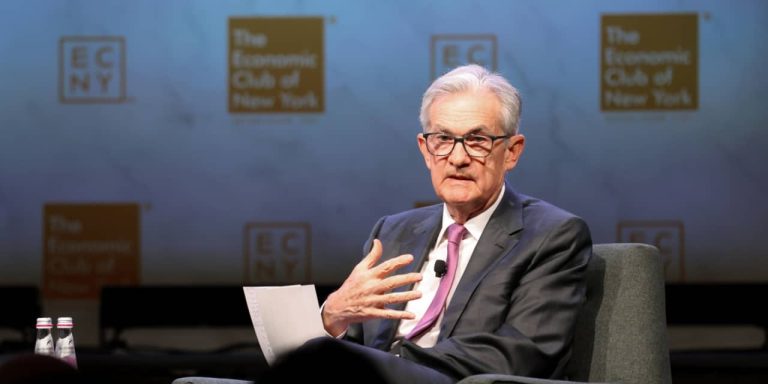Interest rates haven’t been high enough for long enough to bring inflation back down to the Fed’s 2% target, said Federal Reserve Chairman Jerome Powell on Thursday.
Bess Adler/Bloomberg
Hostilities abroad, political dysfunction at home. For the stock market, all of that takes a back seat to interest rates.
The major U.S. stock indexes fell this past week, with the Nasdaq Composite losing more than 3% as longer-term Treasury yields reached the 5% level for the first time in 16 years. That level is shockingly high to many but only matches what passbook savings accounts paid in another era.
Just don’t blame the Federal Reserve for long-term Treasury yields jumping 30 basis points, or 0.3 percentage point, on the week. Neither expected future inflation nor the prospect of a further increase in the central bank’s federal-funds rate target atop the 5.25% of hikes put in place in the past 1½ years are responsible for that benchmark reaching that round number on Thursday afternoon.
Rates haven’t been high enough for long enough to fulfill the Fed’s aim of bringing inflation back to 2%, said Jerome Powell, the central bank’s chairman, in a question-and-answer session following a speech to the Economic Club of New York on Thursday. That tidbit was superseded by the unsurprising headline that the Fed chief appeared to confirm that no fed-funds rate increase was likely at the next policy meeting, which winds up on Nov. 1.
But his description that rates would remain higher for longer is a good deal more important than the parlor game of will-they-or-won’t-they move at the next meeting.
Going back to first principles, longer-term interest rates equal the sum of short-term rates over successive periods, plus a so-called term premium for holding a longer-duration instrument. About two-thirds of the 1.2-percentage-point rise in the 10-year yield in the past three months can be explained by the decrease in the anticipated 2024 rate cuts that had been priced into the fed-funds futures market, which in turn reflects the further deferral of the long-predicted recession.
As Jim Bianco, head and eponym of Bianco Research, notes, this past week was the anniversary of Bloomberg Economics’ Oct. 17, 2022, prediction of a 100% probability of a recession within 12 months. As of this past week, the Atlanta Fed GDPNow was clocking at a 5.4% real annual growth rate for the third quarter. Consensus estimates for the actual number due to be reported this coming week are for robust 4% real growth.
At least some explanation for the economy’s resilience lies with the wealth of American households, which the Fed reported this past week had increased by some $43.4 trillion since the start of 2020, or roughly 30%. “Never before has the U.S. created so much wealth in a short period, and what makes the increase even more difficult to believe is that it occurred during the worst healthcare crisis in 100 years and the sharpest plunge in economic activity on record,” writes Joseph Carson, former chief economist at AllianceBernstein.
This wealth inflation, which can be traced to the most massive aggregate fiscal and monetary stimulus ever seen, could reverse as policies are tightened, Carson adds. But for now, this wealth—concentrated in the hands of the well-to-do, who disproportionately drive overall spending—has defied Fed tightening. Indeed, the wealthiest cohort probably has reaped a windfall from 5% returns on T-bills and money markets from their liquid balances that used to earn virtually nothing.
Many advisors are urging clients to lock in those yields of 5% or higher for the longer term, lest they be cut by the Fed in the coming year. But James Kochan, a former fixed-income strategist at Merrill Lynch and Wells Fargo who has been bearish on bonds, remains cautious about extending maturities. The Fed instead could hike further, perhaps to a 6% fed-funds target; Treasury borrowing is increasing auction sizes, while foreign central bank demand for U.S. securities is waning; and Middle East tensions could further lift oil prices and reverse the improving trend in inflation.
But yields have risen enough so that less-volatile five-to-seven-year maturities will still produce positive returns even if their prices slip further, Kochan relates in an email. High-yield corporate bonds yielding 8% to 9% also provide enough protection against a modest rise in defaults, he adds.
One additional, nettlesome counterpoint to long-term bond bulls: Gold prices were up nearly 3% in the past week, with the October Comex contract settling at $1,982.50, just 3.4% shy of its record of $2,051.50 reached in August 2020. That’s despite the rise in real (that is, inflation adjusted) interest rates and a firm dollar, which ought to hurt the precious metal. Maybe those other aforementioned worries do register in the gold market.
Write to Randall W. Forsyth at [email protected]
Read the full article here









